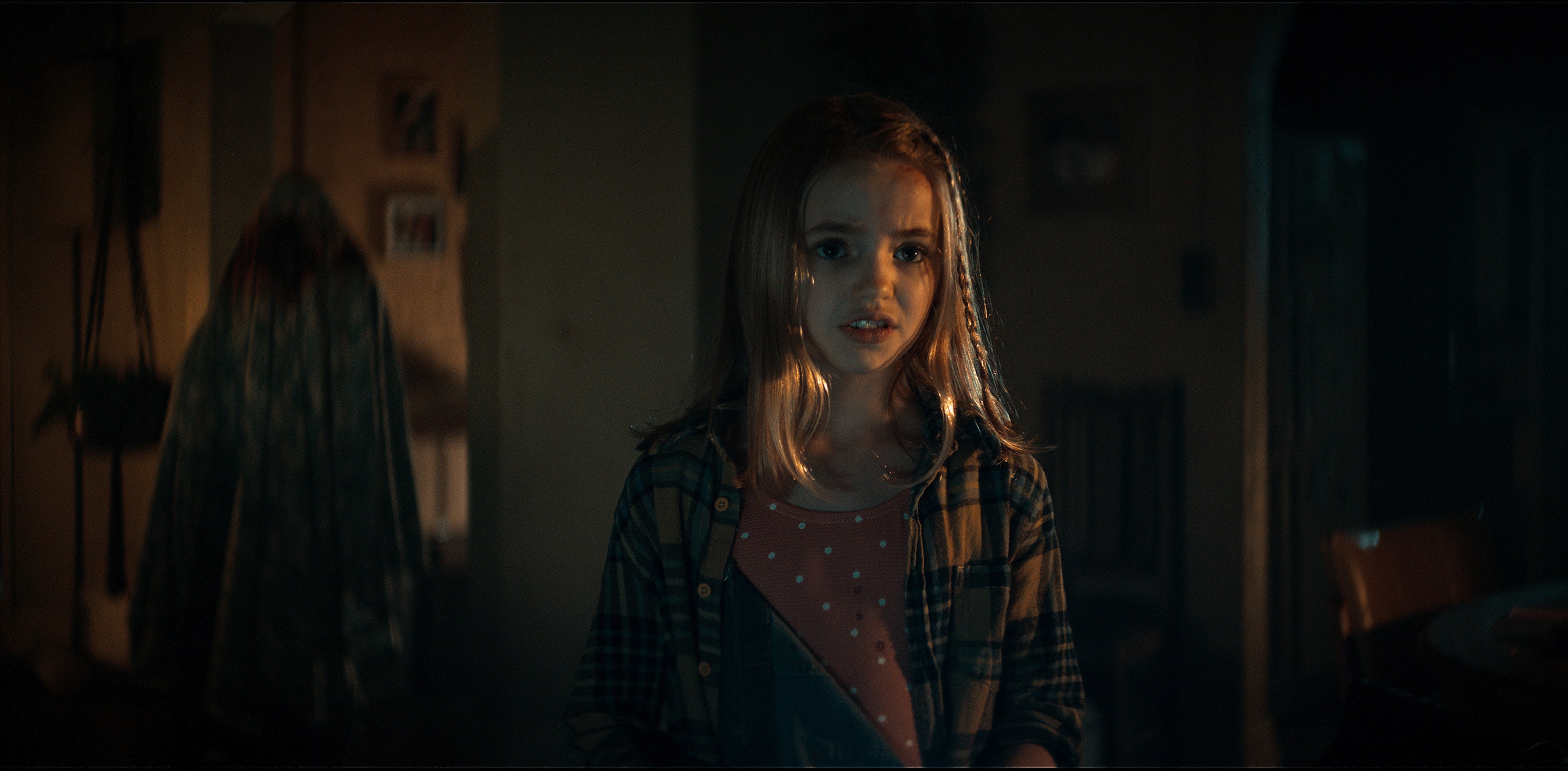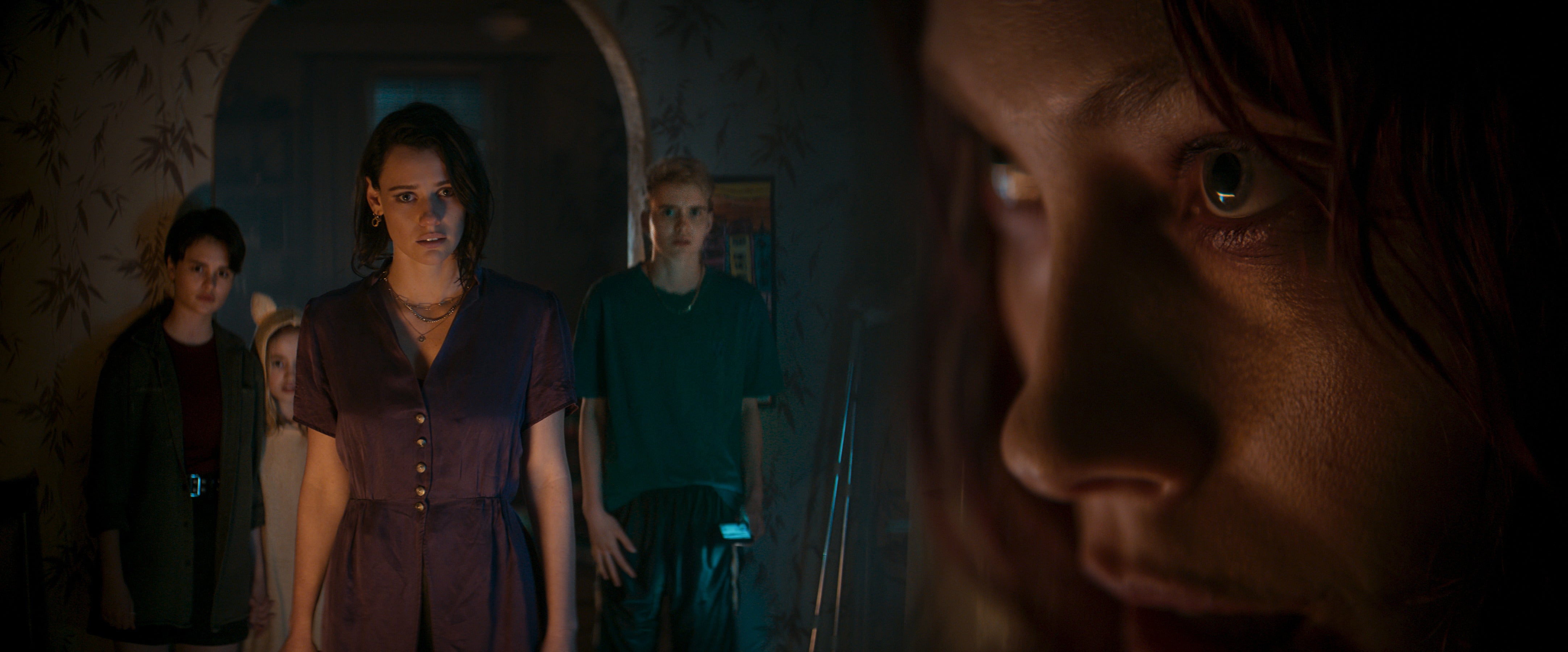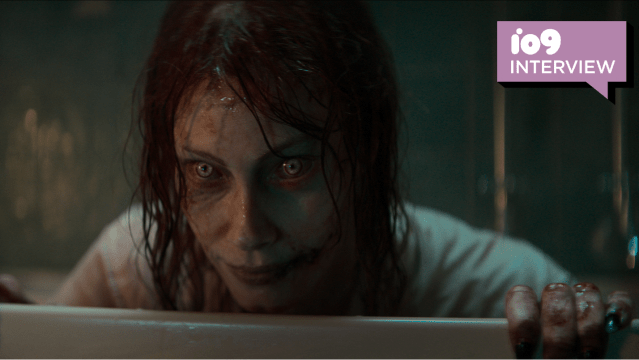Evil Dead Rise hits theatres on Friday, bringing with it copious gore and Deadites galore, but no wisecracking Bruce Campbell; the setting also shifts the action from the woods to Los Angeles. Somehow, it still feels very true to the beloved horror series, and Gizmodo got a chance to talk to writer-director Lee Cronin to learn more.
Cheryl Eddy, Gizmodo: You’ve said in other interviews that you didn’t want to just do another cabin in the woods tale with Ash Williams or an Ash Williams-type character, and obviously Evil Dead Rise changes up the characters and the setting quite a bit. But what were the essential elements you did want to bring in from the series’ past?
Lee Cronin: Ultimately, the spirit and energy of the movies that came before was the key thing that I wanted to maintain. Even if I did it in my own way, using my own approach, voice, vision, I definitely wanted to carry the energy, the kind of relentlessness of the movie. When I was writing the screenplay, the most important word to me was “entertainment.” I wanted to make sure it was an entertaining movie. Despite the splatter fest, despite the level and the volume of horror that’s in it, that was really, really important. I never wanted to waste a moment. I want the audience to really be on the steam train that’s hurtling along with the characters.
So that, and then there obviously was specific things I always wanted to do: the chainsaw [and] the book were a given for me, as was the shotgun. But outside of those things, I was happy to leave stuff behind. I only really wanted to be referential whenever it actually supported or underpinned what I was trying to do with the story. I think even in its own right, this movie has a conclusion that is its own unique thing, outside of Evil Dead — in terms of the kind of monstrous combination of family and all of these things that take place. But the spirit of the movie — the kind of almost independent spirit — was something that I wanted to maintain in making an Evil Dead movie with more resources all these years later.
io9: Evil Dead, especially Evil Dead II, is more of a horror comedy series. And while I think Evil Dead Rise is entertaining, I don’t think I would call it a comedy.
Cronin: No, it’s not a comedy.
io9: What was the tone you wanted to take when you approached it?
Cronin: I like making horror movies, and so I want them to be scary first and foremost. That is the key job. Too often I go and watch horror and I’m actually not scared or at least not feeling the intensity. I wanted to make sure that the pulse of the movie was high and that the audience’s pulse would go high alongside that. But I didn’t want it to be midnight-black or grim. It’s got some moments of cruelty, and it’s got some pretty hardcore moments of horror. But nonetheless, I did want to maintain a certain amount of levity in the movie; I’ve watched it with various audiences, and I think I’ve achieved [that] to a certain extent, in the sense that people do laugh. They laugh at the over-the-top nature of some of the body or horror moments that are in the film.

But also, I think I’ve captured a certain realness or a breath of reality to those characters. Those characters also bring levity through some of the things that they say, because no one’s ever prepared for how to react if — right now, you’re sitting in your room, the door swings open and something monstrous that you never could have imagined comes raging in. You don’t know how you’re going to react or behave. But the one consistent thing is, you’ll still be yourself in terms of that behaviour. In Evil Dead Rise, none of the characters have time to get PTSD, they’re just thrust into the eye of the storm and it goes. There’s a sense of their character maintaining a naturalism to their fear, which equally, I think, draws levity in a few places, to just release that valve ever so slightly so that the audience can catch their breath before we go again.
io9: Evil Dead Rise has some themes in common with your previous feature, The Hole in the Ground: a single mum, children in peril, the idea that loved ones can get taken over or swapped out for horrible creatures. Is that a coincidence or is there something in particular that draws you to these kinds of stories?
Cronin: I didn’t think about it in terms of The Hole in the Ground when I was writing it. But as people have pointed it out, there’s definitely — it’s definitely something I’m drawn to. I think the idea of a loved one changing is a terrifying idea. What I always liked about it in The Hole in the Ground was the idea that you don’t need to be a parent and have a kid, if you’ve had any personal relationship with somebody that has depth to it — and for the first time ever, you see that person behave in a way you’ve never seen before. For example, you’re in a new romantic relationship for a year. You have your first fight and you see a twitch in that person’s eye, or you hear a different octave in their voice that you’ve never heard before, and you realise, “Do I really know this person?” I always think that that is primarily a very terrifying thing. That was in The Hole in the Ground and instinctively, I think did leak through when I was making this movie. But because I knew I was making an Evil Dead movie, I was more thinking about it in those terms, than the terms of what I had done before. But I do continue to get drawn to those type of stories. Misidentification of loved ones, fear. I love my family. We’re very close, we all get on really well. It actually gives me the platform to look at how that could be if it was on the darker end of the spectrum or subverted in some way.
io9: Evil Dead Rise is now in the esteemed pantheon of “horror movies set in apartment buildings,” like Inferno, The Sentinel, Rosemary’s Baby, and so on. What about that setting specifically do you think lends itself to scary movies?
Cronin: I think it’s a particular type of isolation, because you can be surrounded by so many people — in [the case of Evil Dead Rise], the building is not overly populated — but the notion of, you know, “I don’t know who’s above me, who’s below me, or even necessarily who’s left and right of me.” You could be lying in bed or eating your breakfast and you don’t know what the person behind the wall is doing. I’ve always found that kind of fascinating. You touched on Rosemary’s Baby there, which exemplifies that type of thought. You know, I could be sitting there watching, watching Netflix and the person next door is feeding baby tarantulas. I have no idea what the hell they’re doing, and that scares me. And so, as I said, you can be in a building surrounded by hundreds of people, but equally completely isolated from the truth of what’s there. I just think it’s a really good setting for horror context, which is why it’s been used before.

io9: Horror fans, and the perception of horror as a genre, have evolved a lot since the release of the first Evil Dead movie. What is your take on the current state of horror, and do you have an opinion on the phrase “elevated horror”?
Cronin: I think all horror is elevated. I think the nature of what horror movies are is that there’s an elevation on it and a difference to reality. I think we’ve just come out of what people were calling the elevated phase — we were going through a spell, including my film The Hole in the Ground, where horror movies were presented in a slightly more existential way, and maybe less about spectacle and more about the emotion and thematics beneath the surface.
I think, post-covid — and I’m not going to claim I predicted it — I just hoped that people would want to go back to the cinemas and maybe watch spectacle again. I’d made, as I said, this existential or existential-leaning horror with The Hole in the Ground and wanted to then make something that was much more visceral and spectacle-based, obviously maintaining some metaphor because it’s important. I think what we’ve seen recently is really big turnout at the box office for horror movies that actually can be a little bit fun, and that maybe make you lean forward as much as kind of curl up in your seat. I hope we’ll ride that wave for a while, and then no doubt something will happen where it’ll all change and it might get a little bit more inverted and closed-off again. I do think there’s space for so many different types, but I think at the leading edge at the moment, it is definitely horror films that are there to maybe be more entertaining than ponderous.
io9: Obviously Evil Dead is a beloved series and has a lot of fans. They’re going to be curious coming to see your movie. What’s the reaction been, have people been supportive so far?
Cronin: It’s been really great. Like in the last, just a little over a month, I’ve watched the movie with four different audiences, and I want to have that experience because I’m driven by entertaining audiences. So I want to see how people react, what works, what doesn’t work … We did a screening in LA for the Beyond Fest crowd [this week], which was insanity. I’ll kind of never forgot that night. But yeah, people are supportive. I think what people are really enjoying is that — when the movie was first announced, people were suspicious: “Oh, it’s Evil Dead, but it’s not the cabin.” It’s the first time it didn’t at least hold on to that trope because Evil Dead 2013 had no Ash, but it still had the cabin, it still had that familiarity. But I think people have been really pleasantly surprised by the fact that the movie feels very much like an Evil Dead film, but also feels fresh at the same time. People seem to be embracing that, which makes me very happy because that was my intention. But so far all I’ve felt is, generally speaking for the vast majority, support and love towards the movie.

io9: And you do have the the opening that winks at the cabin and the famous Evil Dead “zoom.”
Cronin: I wanted to let people know that they could be confident that I understand what an Evil Dead movie is… but also that I wanted to subvert your expectations a little.
Evil Dead Rise hits theatres April 21.
